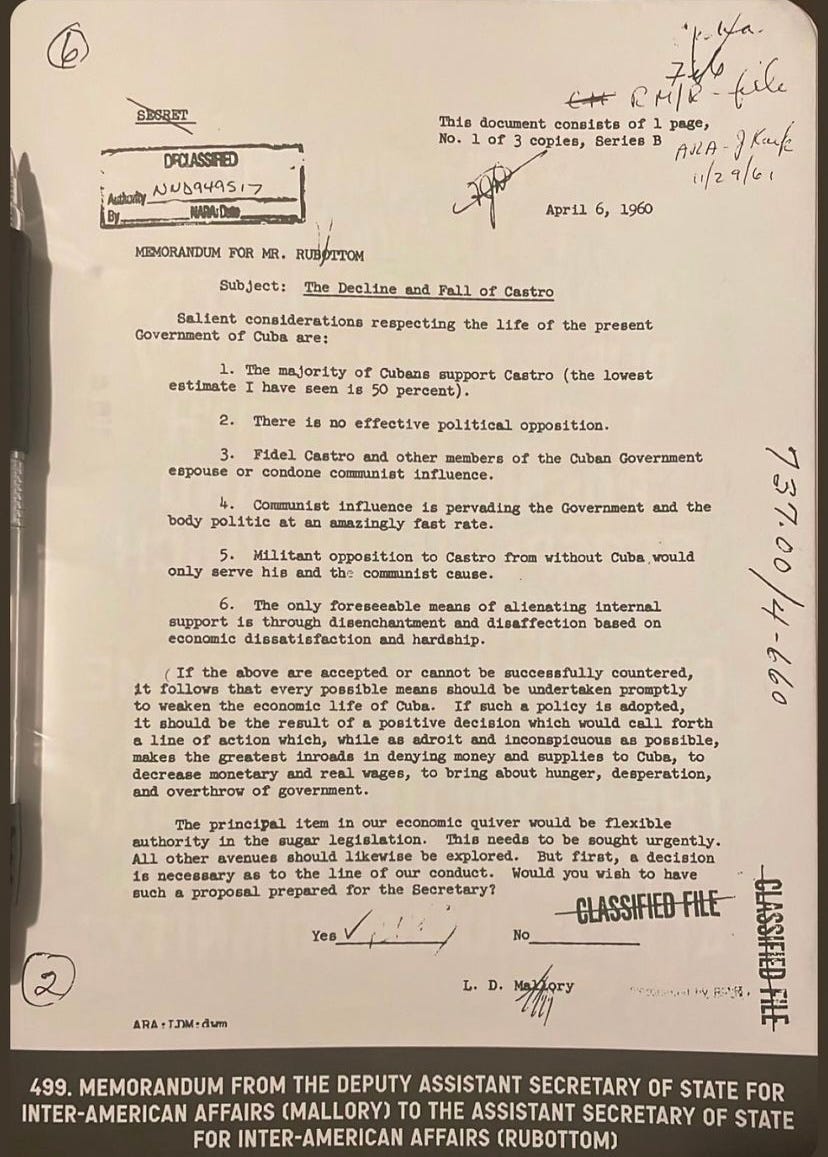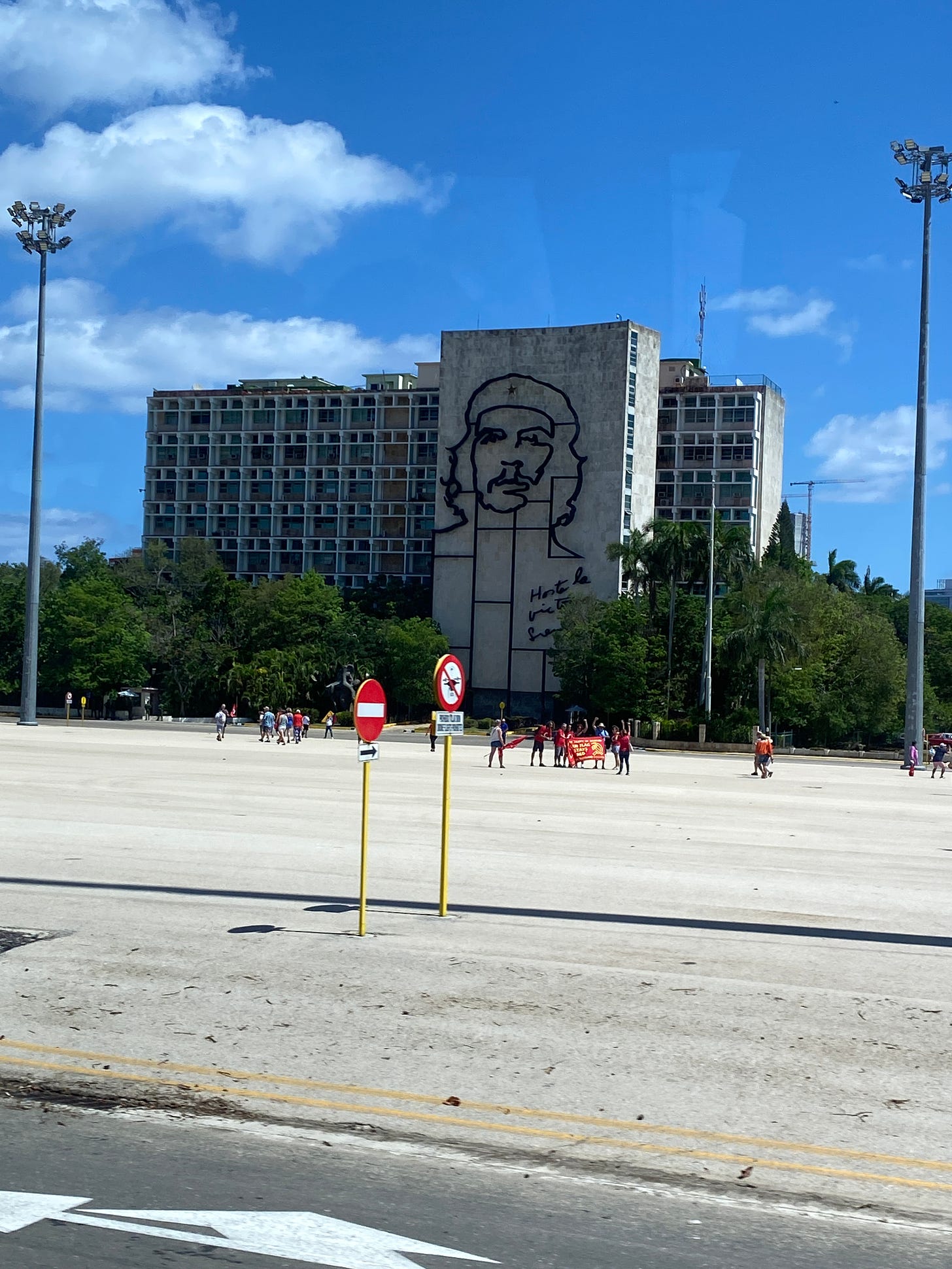Report back: 60+ Years of Inhumane U.S. Blockade on Cuba
Reflections from my May Day Brigade to Cuba
This report back was also featured on CodePink: Pink Tank Blog. S/O to the amazing organizers over at CodePink for sponsoring my spot on the brigade and for improving my anti-imperialist, anti-war politic every day.
We entered Cuba on May 3rd, 2023 with a base-level understanding of the U.S. blockade, its intent and purpose, and how it has impacted the Cuban people for the last 60+ years. Over the next 10 days, we discovered the depths of the U.S.’ economic, political, psychological, and emotional warfare against the Cuban people. Beyond just a lofty economic measure, the blockade is intended to squeeze the life out of Cuba, to turn its people against the government and against socialism, and to ensure that U.S. hegemony continues to dominate the region and the globe. While the blockade has been largely successful over the past 60+ years in making survival severely challenging in Cuba, we also learned that the resilience and collectivism of the Cuban people is a force quite possibly stronger than the United State’s desire for dominance.
The intentions of the blockade and the subsequent hybrid war on Cuba were plainly stated in this 1960 memorandum from the Deputy Assistant Secretary of State for Inter-American Affairs to the Assistant Secretary of State for Inter-American Affairs:
In a time of heightened anti-communism, the U.S. was painstakingly clear that they would do whatever it takes to turn the Cuban people against their leaders and to influence the eventual “overthrow of the government.” While the specifics of the economic measures against Cuba were not yet laid out, it was clear that an all-out assault on Cubans’ livelihood was the goal. The U.S. never intended to simply oust Castro and the communist leadership, as is often the case when the U.S. orchestrates coups against elected officials who subvert U.S. power - all in the name of “democracy” and “protecting the people.” In the case of Cuba, however, the U.S. early on recognized the popularity of Castro and communism as a dire threat. With Cuba being just 90 miles off the coast of Florida, the possibility of communism reigning so close to U.S. soil put the entire U.S. domestic project at risk - what if Americans discovered the possibilities for life under socialism? From the beginning, the U.S. has chosen a full-out assault on all Cubans to prevent the export of socialist ideas beyond the island.
For the past 60 years, the U.S. has made economic sovereignty nearly impossible for Cuba. Our government has restricted naval trade to Cuba, retaliated against any other nations who dare to support Cuba, threatened companies who considered doing business with Cuba, and much more. One of the most inane sanctions measures specifies that Cuba may not import any goods that utilize more than 10% of U.S. made components - effectively cutting off Cuba’s access to any goods where U.S. manufacturers dominate the market. When former President Trump added an additional 200+ measures to the already extensive list of sanctions against Cuba and added the nation to the state sponsors of terrorism list with no evidence for such a decision, Cuba’s struggle to remain afloat was made even more severe. In just 1 year after being added to the terrorism list, Cuba lost relationships with over 100 banks around the world. Nations who would otherwise be supportive of Cuba find themselves stuck between a rock and a hard place as transactions with Cuba are flagged due to the terrorism designation, putting that nation’s relationship with U.S. markets at risk. When the German plant that offered medicinal oxygen on the island malfunctioned, the U.S. threatened other manufacturers to prevent them from providing this life-saving good to Cuba - directly resulting in lives lost. Most recently, there is a severe fuel crisis in Cuba directly caused by the blockade. While the island needs an average of 600 tons of fuel a day, they are currently being forced to make do with less than 300 tons a day. This means that food is unable to be transported from one end of the island to the other; lines for city buses are long and hopeless; rolling blackouts plague the island; and critical infrastructure is at risk. There are hundreds of other stories that highlight the depths of the U.S. anti-socialist and anti-Cuba measures to ensure Cubans’ right to sovereignty and economic prosperity is made impossible.
By making life in Cuba unsustainable through inhumane sanctions, the U.S. is making due on its promise to undermine the Cuban people’s allegiance to socialism and to their nation. The blockade’s measures extend beyond the national economy into the personal. The average anti-blockade American can’t simply wire funds or send goods to support the Cuban people - these transactions, too, are flagged and prevented. Only a select few organizations have the means to provide support to Cubans through impossibly bureaucratic processes, severely limiting the possibility of economic solidarity between regular Americans and Cubans.
What does all this mean for actual life in Cuba under the blockade? Cuba has some of the most progressive economic and social policies in the region and globally. Despite the difficulty of governing under severe sanctions, the Cuban government prioritizes funding education, healthcare, and social services - all failing sectors under U.S. capitalism. Among the long list of Cuba’s healthcare advancements include developing multiple COVID-19 vaccines while vastly under-resourced, developing preventative treatments for lung cancer and diabetic ulcers, and educating hundreds of doctors who then return to provide vital care in their underresourced communities. Because of the 99% literacy rate and comprehensive historical education provided to every Cuban, the average Cuban we met on the street possessed well-informed opinions on Cuban economics and politics. Whereas the average American can’t explain their pro-capitalism and anti-communism stance, every Cuban we met, regardless of their political standing, was able to articulate clearly why they held their opinions and could provide factual evidence. This means that the $500m a year that the U.S. pours into anti-Cuban propaganda is not entirely successful. Unfortunately, many young Cubans fall victim to such propaganda that posits capitalism as the freer alternative to socialism. The factual evidence is to the contrary - thousands of Americans without homes while thousands more stand vacant, millions of jobs that don’t pay a living wage, and many more archaic policy failures make survival a challenge for many Americans. However, as we heard from conversations with regular Cubans who have fallen victim to this propaganda, the myth of easily accessible wealth, celebrity, and home ownership is the version of the U.S. that is exported around the world - never mind the fact that 80% of Cubans own their homes or are on their way to doing so. When we poked holes in the American myth for those we talked to, we could see on their faces the mental processing of a reality that is antithetical to the version of capitalism they are sold. However, elders on the island who lived through the revolution stand strong by Fidel, by socialism and the revolution, and by a free Cuba.
Thus while education and healthcare don't pose as barriers to survival for Cubans in the same ways they do for Americans, Cuban people still have to get creative with finding ways to feed their families and procure essential goods. The government’s intention and policy record depict a true commitment to raising the consciousness and standard of living for all Cubans, but as long as the nation is strangled by the blockade, survival remains a challenge. Communities hold each other up as the blockade continues to try to tear Cubans down. Upon witnessing the work of CDRs - committees for the defense of the revolution - we witnessed the multi-generational community care that makes life under the blockade manageable through collectivism. We were continuously surprised by the lack of anti-American sentiment among Cubans, but Fidel’s words remain true: Cubans recognize that the working-class people of the U.S. have never been the same as our violent government, and solidarity is Cuba’s domestic and international policy default. We have much to learn from Cuba on community organizing and care, on popular education and eradicating racism and patriarchy from our communities, on how to build an educational system that supports critical thinking and historical awareness, and on how to forge a governance system that encourages participation and values difference.
Cuba is far from perfect in its attempts at shoring up its economy and making the island liveable for its residents. Still, the government’s commitment to its people is evident in nearly every policy that attempts to combat the inhumane blockade. Yet as is the case in every modern nation, the mechanisms of policing and the encroachment of capitalism threatens the revolution. Cuba is one of the only nations whose revolution for independence was intrinsically linked to the abolition of slavery. This means that from the beginning, Black Cubans have been active in forging the ongoing revolution. Yet still, a cop is a cop is a cop no matter where in the world they police. When visiting Old Havana, multiple people on our brigade witnessed the protection of property and tourist interests be placed above the safety and freedom of poor Cubans. On more than one occasion folks witnessed police accost and harass locals for speaking with us tourists, and at least one person was swiftly taken away by cops for this offense. A brigadista was able to step in and prevent this fate for a local she’d connected with, and after the police finally left the local explained the exorbitant fines and incarceration period they would’ve faced. On the other hand, when we were able to ask state officials about the nature of crime and policing, we were given a summary of Cuba’s policy of prevention. In recognizing what abolitionists have long pointed out that “crime” often stems from poverty and other social issues, Cuba dedicates its resources to holistically supporting folks, particularly young people, before “crime” becomes an option. Our experiences witnessing policing at work represent a blemish on the face of the nation and a disappointing confirmation that policing works in favor of the rich and white over the poor and Black globally. My hope is for the Cuban government to make true on its commitment to freedom for all Cubans by putting an end to policing and prisons.
With all things considered, we were assured by nearly everyone we spoke to that the revolution in Cuba is an ongoing process. Critique and material analysis is welcome to help the Cuban project continue to evolve towards a more socialist state. Fidel and so many revolutionaries since have acknowledged that the eradication of capitalism does not automatically eradicate machismo and patriarchy, anti-Black racism, gender-based violence, etc. The Cuban state’s ongoing commitment to closing the gap between individuals through systemic measures represents a beacon of possibility. In our lifetime or the next, we will see the end of capitalism and exploitation. We will also see the end of policing and prisons everywhere - and I firmly believe that these projects are intrinsically linked. We will see the end of environmental degradation, of U.S. imperial hegemony, of all forces and systems that place profit and property over people. We were lucky enough to witness Cuba’s ongoing revolution, and upon return to the U.S. we are ready to take up our responsibility to end the blockade and put a stop to U.S. imperialism from inside the belly of the beast.





